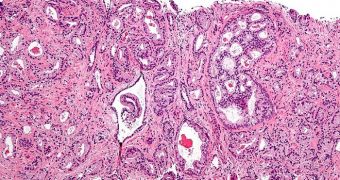According to the conclusions of a new study conducted by researchers at the University of California in Los Angeles (UCLA), it would appear that employing a low-fat diet is an effective way of reducing the bloodstream inflammation biomarkers that are associated with the relapse of prostate cancer.
The investigation was conducted on a group of male participants, half of which were put in the dieting group. They were not allowed to eat fat food, and were prescribed fish oil supplements as they dieted. The other group continued to consume a typical Western diet.
UCLA scientists say that people in the first group exhibited a lower cell cycle progression (CCP) score, which is a value that plays a role in the recurrence of prostate cancer. At the same time, the amount of pro-inflammatory substances in participants' blood were significantly reduced.
The findings are very important because a lower CCP score helps prevent the reemergence of prostate cancer. Usually, when such tumor reoccur, they are more resistant to drugs and chemotherapy than before, putting patients at increased risk of metastasis and death.
The research team was led by UCLA clinical professor of urology William Aronson, who is also the chief of urologic oncology at the West Los Angeles Veterans Affairs Medical Center.Aronson was the lead author of a paper on the new study, published in the journal Cancer Prevention Research.
“We found that CCP scores were significantly lower in the prostate cancer of men who consumed the low-fat fish oil diet, as compared to men who followed a higher-fat Western diet,” Aronson explains.
“We also found that men on the low-fat fish oil diet had reduced blood levels of pro-inflammatory substances that have been associated with cancer,” he adds. The new research was supported by a grant from the US National Institutes of Health (NIH).
The most important conclusion of the research is that people may indeed be what they eat, when it comes to preventing the reemergence of prostate cancer. Dieting has been known to cause positive effects in patients for a long time, but this study reveals just how beneficial this habit really is.
Officials statistics for the United States show that roughly 23,000 men are diagnosed with prostate cancer each year. Around 29,000 patients die from tumors caused by this form of cancer. The new research could set the stage for advanced treatments.
In addition, the work could be used to develop a way of identifying patients that are more at-risk of developing aggressive cancers, potentially allowing doctors more time to treat the condition.

 14 DAY TRIAL //
14 DAY TRIAL //